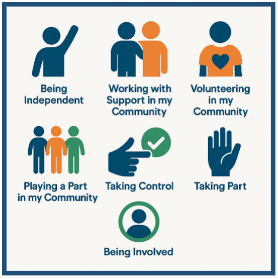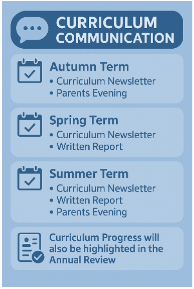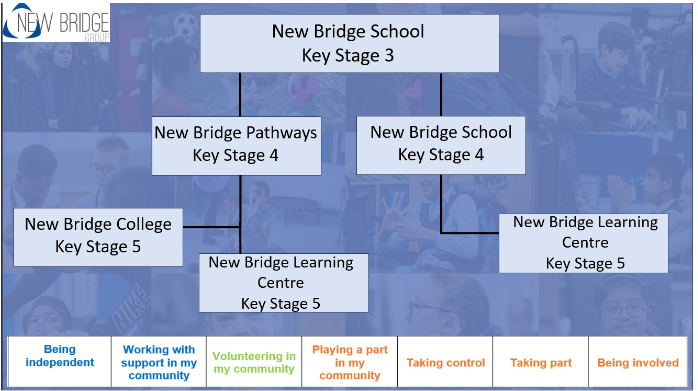Curriculum
(Pathways)
At New Bridge Pathways our curriculum is designed to empower every pupil to lead a fulfilling, meaningful, and as independent a life as possible. We offer a personalised, flexible learning experience that meets the unique needs of our learners.
Our Curriculum Is Based on 7 Destinations.
Everything we teach is underpinned by seven key long-term outcomes – what we call our seven destinations. These guide our planning, teaching, and assessment, ensuring every learning experience moves your child closer to their individual goals for adulthood.
Everything we teach is underpinned by seven key long-term outcomes – what we call our 7 Destinations. These guide our planning, teaching, and assessment, ensuring every learning experience moves your child closer to their individual goals for adulthood.

These destinations reflect not only academic progress, but also personal development, life skills, and preparation for adulthood, employment, and community inclusion.
A Structured School Day
Our curriculum is delivered through a secondary model timetable, helping students prepare for the structure and expectations of adulthood. Learners have six lessons each day, providing variety, routine, and the opportunity to access a broad and balanced curriculum throughout the week.
How We Deliver Learning
At New Bridge Pathways, we know that strong, trusting relationships help our pupils feel safe, confident, and ready to learn. That’s why we use a blended teaching approach that combines consistency with specialist expertise.
Your child will spend the majority of their week - around 70% of their time - with their Form Tutor, who delivers most of the core subjects such as English, Maths, and Learning for Life. This helps to build a strong, supportive relationship and creates a calm, predictable routine.
The remaining part of the timetable - about 30% - is taught by specialist Teachers. These Teachers bring their expertise and passion to subjects like PE, Science and Food Technology, offering exciting, creative experiences that help learners discover their interests and talents.
This balance ensures that every learner benefits from consistency, connection, and high-quality specialist teaching across a wide and enriching curriculum.
Key Curriculum Strands
All of our learner’s access subjects from the National Curriculum, carefully adapted to meet their individual needs, learning styles, and abilities. Lessons are designed to be inclusive, engaging, meaningful; ensuring that every learner can experience success, make progress, and enjoy their learning journey.
Our lessons are designed to be inclusive and engaging, allowing every learner to:
- Make progress at their own pace
- Experience a sense of achievement
- Develop confidence and enjoyment in learning
We ensure that all learners are supported to reach their full potential across the following key curriculum areas:
Core Subjects
These subjects form the foundation of our curriculum and are closely linked to the development of communication, cognition, and essential life skills:
- English – Focused on communication, reading, writing, speaking and listening, with emphasis on functional literacy and self-expression
- Mathematics – Practical and functional numeracy, including number, money, time, and problem-solving skills that apply to everyday life
- ICT (Information & Communication Technology) – Basic digital literacy, using technology for communication, creativity, and learning how to stay safe online
- RSHE (Relationships, Sex, and Health Education) – Supporting personal development with a focus on friendships, healthy choices, consent, safety, and emotional well-being.
- Living Skills – Promoting independence through daily life skills such as hygiene, cooking, laundry, personal organisation, budgeting, and shopping
Foundation Subjects
Our creative and expressive subjects allow pupils to explore talents, build confidence, and develop fine and gross motor skills. They also contribute to emotional regulation and social interaction:
- Food Technology - Essential life skills in cooking, nutrition, and food safety while encouraging creativity, healthy living, and an understanding of how food impacts our bodies and the environment
- Science – Hands-on exploration of the world, developing curiosity and understanding through sensory and experiential learning
- PE (Physical Education) – Adapted physical activities to support health, fitness, coordination, and teamwork
Learning for Life
In addition to subject-based learning, all our learners take part in Learning for Life sessions. These sessions are specially designed to help each learner make steady progress towards their Education, Health and Care Plan (EHCP) outcomes.
Each learner has personalised goals—sometimes called small step targets—that break down their annual EHCP targets into manageable, achievable milestones. These goals might focus on areas such as:
- Social and emotional well-being
- Mental health support
- Physical or sensory development
- Communication and interaction
- Building independence and confidence
These sessions are delivered by the Form Tutor, who knows them well and plans bespoke, meaningful activities to support their development in these areas. Whether it’s learning how to manage emotions, improving communication, or developing key physical skills, Learning for Life helps ensure your child is supported in every aspect of their growth—not just academically, but as a whole person.
This targeted, nurturing approach is at the heart of our commitment to preparing every learner for their next steps in life, both in and beyond school.
Progress and Assessment
We use a variety of approaches to track progress in a meaningful and personalised way.
We use a secure online platform called Evidence for Learning to gather photos, videos, and written observations that capture achievements across both academic subjects and personal development areas. This helps us build a clear picture of how your child is progressing—not just in their learning, but in areas like communication, independence, social skills, and emotional well-being.
Progress is measured in several key areas:
- Academic progress – through personalised subject targets across English, Maths, Science, and more
- EHCP outcomes – by tracking small-step targets linked to your child’s individual plan
- The seven destinations – our long-term life goals that guide everything we teach, including independence, community involvement, and personal control
Every pupil has their own set of tailored targets, which are reviewed regularly and updated in response to their needs.
This joined-up approach helps us celebrate every success, identify areas for support, and ensure that your child is always moving forward on their own unique pathway.
Curriculum Communication Throughout the Year

At New Bridge Pathways, we believe that strong communication with families is key to supporting each child’s learning journey.
Over the course of the year, you will receive regular updates about your child’s progress and the curriculum they are following.
Each term, we will share a Curriculum Newsletter giving you an insight into what your child is learning in class.
You will also be invited to attend Parents’ Evenings in the Autumn and Summer Terms, where you’ll have the opportunity to speak with staff about your child’s progress, strengths, and next steps. In Spring and Summer, you will receive a written report covering both academic progress and EHCP outcomes. In addition, your child’s Annual Review will provide a further opportunity to discuss curriculum engagement and progress in relation to their individual needs and targets. We’re committed to working in partnership with you every step of the way.





